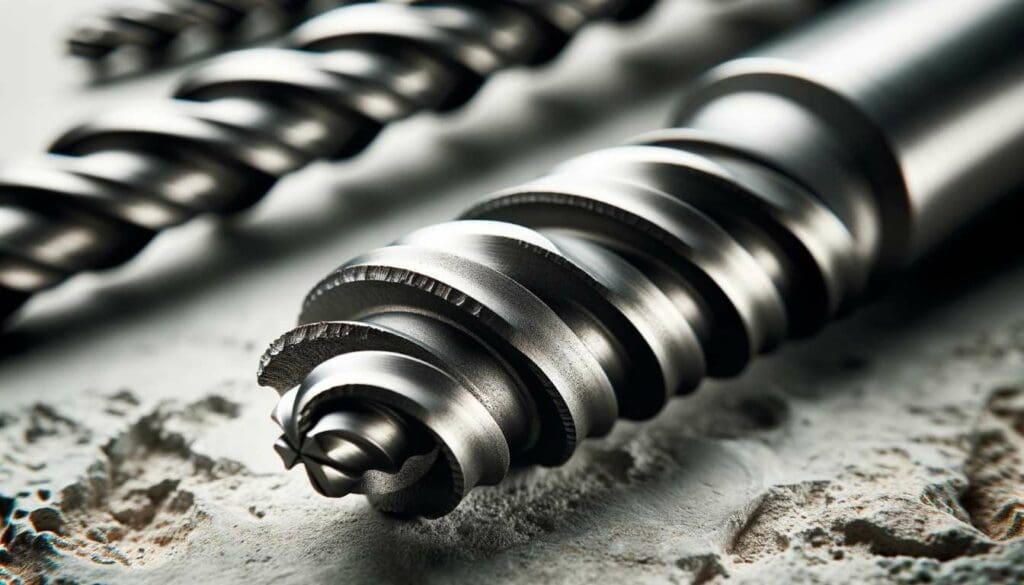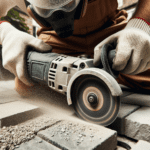When undertaking a concrete drilling project, your tools and techniques can significantly influence the outcome. Given the toughness and density of concrete, having the right drill bit becomes paramount. This comprehensive guide dives deep into the various drill bits suitable for concrete, elucidating on their design, utility, and efficiency. We’ll clarify their unique features and applications from the rugged masonry bits tailored for concrete, brick, and stone to the versatile twist drill bits and the potent SDS bits. Additionally, we’ll address common queries regarding concrete drilling, ensuring you’re well-equipped for your next drilling endeavour. Whether you’re a seasoned contractor or just venturing into DIY projects, this guide aims to give you the knowledge to drill into concrete with precision and ease.
What type of drill bit is good for concrete?
Drilling into concrete demands the right drill bit for efficient results. Concrete, being a dense material, necessitates specialized bits. This piece covers the best drill bits for concrete, weighing factors like material hardness, drilling speed, and durability. Let’s explore the drill bits apt for concrete and similar materials.
MASONRY BITS
Masonry bits are crafted from materials like concrete, brick, and stone.
- Carbide-tipped masonry bits have tungsten carbide tips, suitable for high-speed drilling in concrete, though they might falter with extremely hard concrete.
- Diamond-tipped masonry bits have diamond coatings, perfect for hard materials but costly for regular projects.
- Percussion masonry bits work with hammer drills, offering good impact resistance but might not excel with larger holes.
- Straight shank masonry bits fit regular drills and are useful for smaller holes in concrete and other materials. When selecting a masonry bit, consider the material, hole size, and drilling tool. Safety gear, like eye protection and a dust mask, is vital when drilling.
TWIST DRILL BITS
Twist drill bits are favoured for concrete due to their spiral design and efficiency. They come in materials like high-speed steel, cobalt, carbide tipped and solid carbide. High-speed steel bits are durable and affordable, while cobalt bits offer strength. Carbide-tipped bits offer efficient concrete drilling, and solid carbide bits are great for hard surfaces. These bits also feature coatings like black oxide and titanium, reducing friction and increasing lifespan. Twist drill bits stand out for their speed and range of options.
SDS BITS
SDS bits are prevalent for concrete drilling. Meant for hammer drills, they excel with tough materials. Their slotted shank allows a powerful drilling action and prevents slipping. The bit’s ability to lock in the chuck ensures stability. SDS bits offer faster drilling and precise holes paired with a hammer drill. In essence, SDS bits offer reliability and efficiency for concrete drilling tasks.
How Can You Tell If A Drill Bit Is Designed For Concrete?
Observe its material and design to ascertain if a drill bit is apt for concrete. Drill bits tailored for concrete often possess tungsten carbide or durium tips, known for their robustness. They typically have a narrow arrow-shaped head for smooth penetration and display rough, hard edges, indicating their suitability for dense materials. Using a masonry bit alongside a hammer drill is recommended for optimal drilling into concrete.
Do I Need A Hammer Drill For Concrete Drilling?
For drilling into concrete, a hammer drill is essential. Unlike regular drills, hammer drills are designed specifically for tough materials like concrete, employing a hammering action that eases penetration into dense surfaces. This mechanism ensures quick and efficient drilling, minimizing effort. In contrast, standard drills depend solely on rotational force, which can struggle with concrete, leading to potential overheating, increased wear on the drill bit, and a slower process. Thus, investing in a hammer drill is recommended for efficient and accurate drilling into concrete.
Frequently Asked Questions

When drilling into concrete, using the right drill bit is essential for efficient and successful results. The wide range of drill bits available on the market makes it unclear whether one is best suited for concrete. In this article, we will address some frequently asked questions about drill bits for concrete and provide valuable insights to help you make an informed decision. Whether you’re a DIY enthusiast or a professional contractor, understanding the different types of drill bits and their applications will ensure you achieve accurate and clean holes in the toughest materials.
Can you use a regular drill for concrete?
No, a regular drill is not recommended for drilling into concrete. While a regular drill can be used for various tasks, such as drilling holes in wood or metal, it is not designed to handle concrete’s tough and dense nature.
Concrete is a hard material that requires a more powerful tool to penetrate it effectively. A regular drill lacks the necessary impact force and power to drill into concrete efficiently. Attempting to use a regular drill may lead to frustration, slow progress, and potentially damage the drill bit or the drill itself.
For drilling into concrete, it is advisable to use a hammer drill. Hammer drills are specifically designed to tackle tough materials like concrete. They feature a hammering mechanism that delivers rapid, short, hammer-like blows to break through the concrete, making the drilling process faster and more efficient.
When using a hammer drill to drill into concrete, it is also essential to use the appropriate drill bit. A masonry drill bit, also known as a carbide-tipped masonry bit, is specifically designed for drilling into materials like concrete and masonry. Its tungsten carbide tip can withstand extreme pressure and friction during drilling.
In summary, while a regular drill may be suitable for some drilling tasks, it is not recommended for drilling into concrete. To achieve efficient and accurate drilling in concrete, it is best to use a hammer drill with a masonry drill bit. This combination will provide the necessary power and impact to tackle even the toughest materials.
Is it better to drill concrete at a slower speed?
When it comes to drilling into concrete, the speed at which you operate your drill plays a crucial role in the success of your project. While it may be tempting to drill at high speeds for a faster completion time, drilling concrete at a slower speed is generally recommended.
Drilling concrete at a slower speed is important for several reasons. Firstly, it helps prevent overheating of the drill bit. Concrete is a dense and tough material that generates significant heat during drilling. Operating the drill at a slower speed allows the drill bit to cool down, reducing the risk of damage due to overheating.
Additionally, drilling at a slower speed provides better control and accuracy. Concrete is a hard material that requires precision when drilling. Maintaining a slower speed gives you more control over the drilling process, ensuring you create clean and accurate holes.
The recommended speed range for drilling concrete can vary depending on the specific drilling task and the type of drill being used. It is best to consult the manufacturer’s guidelines for your specific drill model to determine the optimal speed range for drilling into concrete.
Spilling concrete slower is advisable to prevent overheating and maximize control and accuracy. Take the time to adjust your drill’s speed to ensure the best results when working with this tough and dense material.
Are concrete and masonry drill bits virtually the same?
Concrete and masonry drill bits may look similar, but their key differences make them suitable for their respective applications.
Fabrication: Concrete drill bits are specifically designed to drill through tough materials like concrete and masonry. They are made with a harder and more durable material than masonry drill bits. This allows them to withstand the high friction and heat generated during drilling.
Shanks: The shanks of concrete drill bits are often larger and more robust than masonry drill bits. This is because drilling into concrete requires more torque and power. The larger shanks provide better stability and prevent the bits from slipping or breaking during drilling.
Tips: Concrete drill bits typically have a tungsten carbide tip, which is extremely hard and can withstand the abrasive nature of concrete. On the other hand, masonry drill bits have a tip made of softer carbide or a combination of carbide and steel, as they are primarily used for drilling into softer materials like brick and stone.
When using concrete and masonry drill bits, choosing the right type of drill is important. Both corded and cordless drills can be used, but a hammer drill is highly recommended for drilling into concrete. The hammering action of the drill helps break through the dense concrete more effectively, making the drilling process faster and more efficient.
In summary, while concrete and masonry drill bits may appear similar, their fabrication, shanks, and tips are specifically designed to meet the challenges posed by their respective applications. Using the right type of drill, such as a hammer drill for concrete, ensures optimal performance and helps achieve accurate and clean holes.
Are there different types of masonry bits that may fit on my drill?
When selecting masonry bits for your drill, it is important to consider several factors to ensure compatibility. Not all masonry bits are designed to fit every type of drill, so choosing the right type for your specific drill model is essential.
One factor to consider is the drill’s shank type. There are three common shank types for masonry bits: round shank, hex drill bits, and SDS bits. Round shank bits are cylindrical and compatible with most standard drills. Hex drill bits are hexagonal and commonly used with hammer drills. On the other hand, SDS bits feature a specialized SDS chuck system that provides a secure fit and is primarily used with SDS-compatible hammer drills.
To determine if all masonry bits will fit your drill, ensure that the bit’s shank matches your drill’s chuck type. For example, if your drill has a round shank chuck, use masonry bits with a round shank. However, if you have a hammer drill with an SDS chuck, you must use SDS bits for a secure and efficient fit.
Choosing the correct shank type for your drill ensures that masonry bits fit properly and function effectively. This consideration is crucial to prevent any potential damage to your drill or the masonry bit itself.
In conclusion, not all masonry bits will fit every drill. Determining the drill’s shank type and selecting compatible masonry bits to ensure a secure fit and optimal performance during your drilling projects is essential.
How do I drill bigger holes in concrete and masonry?
You will need a special drill bit known as a masonry core drill bit to drill bigger holes in masonry. These specialized bits are designed to cut larger diameter holes in tough materials like concrete, brick, or stone.
Masonry core drill bits are large, hollow, cylinder-shaped bits with diamond-tipped teeth. The diamond-tipped teeth are incredibly hard and durable, effectively cutting through dense masonry materials.
To use a masonry core drill bit, you attach it to a suitable drill or drill press. As you begin drilling, the diamond teeth on the bit will grind away the masonry, creating a perfect circle-shaped hole. The hollow centre of the bit collects the drilled-out material, keeping the drill bit cool and preventing clogging.
Drilling bigger holes in masonry using these core bits is particularly useful when installing plumbing pipes or conduits in walls or floors. The larger diameter allows for a snug fit, ensuring the pipes or conduits are properly seated.
It’s important to use the correct size and type of masonry core drill bit to ensure accuracy and efficiency. Always wear safety gear, such as goggles and a dust mask, while drilling into masonry.
What Does A Masonry Drill Bit Look Like?
A masonry drill bit is a specialized drill bit designed for drilling into tough materials such as concrete, brick, and stone. It has a distinct appearance sets it apart from other types of drill bits.
One of the most noticeable features of a masonry drill bit is its spiral design. Unlike standard drill bits with more widely spaced spirals, a masonry drill bit has a tight spiral pattern. This design allows for greater pressure and more efficient drilling in dense materials.
Masonry drill bits also often have a tungsten carbide tip. Tungsten carbide is an extremely hard and durable material that can withstand the rigours of drilling into tough masonry. The tip is usually slightly wider than the bit’s body, which helps prevent jamming and provides a smooth drilling experience.
In terms of size, masonry drill bits come in a wide range of diameters to accommodate different hole sizes. They can range from small drill bits for making pilot holes to larger ones for creating larger holes or conduits.
In conclusion, a masonry drill bit has a tight spiral design and a tungsten carbide tip, making it suitable for drilling into tough materials like concrete. Its distinctive appearance and range of sizes allow for accurate and efficient drilling in masonry applications.




